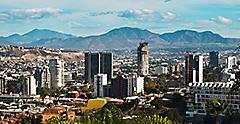The Ultimate Baja Travel Guide & Tips
Explore Baja: A Land of Compelling Beauty.
By Melissa Alvarado Sierra | Published on March 29, 2022
The Baja California Peninsula, also known as just Baja, is home to the two Mexican states Baja California and Baja California Sur. Baja is Northern Mexico's most rugged destination, home to craggy mountains, cactus forests and transparent waters lapping onto white-sand beaches.
For those seeking to get away from the stresses of life, taking a vacation cruise to Baja is an ideal destination. And this Baja travel guide will help you enjoy every sunny spot and shady nook.

The Wanderlust Adventure Starts In The North Baja
Let's start with the northernmost towns of Baja: Tijuana and Ensenada. Most people in Baja live in Tijuana or Ensenada, and the rest of the area, about 15 million acres, is mostly preserved and protected thanks to national parks like Picacho del Diablo and San Pedro Mártir. When planning out what to do in Baja California you really don't want to miss out on these stunning parks, especially when traveling with kids.
Tijuana, or TJ as the locals call it, has really grown into its own and is today regarded for its modern architecture, inventive arts and delicious cuisine. The doorway to the Tourist Corridor of Baja, Tijuana is home to the iconic Tijuana Cultural Center, designed to look like a giant sphere and known locally as La Bola (the ball). The center features a big esplanade for festivals and concerts, art classes for kids, a bookshop and craft shops. For history buffs, visit the permanent exhibition called Museo de las Californias (Museum of the Californias), which includes hundreds of pieces depicting the history of Baja and the state of California. There's also a botanic garden, a café and bistro, a theater, and an IMAX cinema popular for watching animated films.

For food, make sure to stop at Caesar's, where you can try the original Caesar salad recipe — rumor has it the famed salad was invented here by Italian chef Caesar Cardini. For a taste of Tijuana's up-and-coming food scene, head to Mission 19 in Zona Río for Baja California fusion dishes or Telefónica Gastro Park for gourmet meals and artisanal beer. Then walk around Avenida Revolución to find art galleries, boutique shops and local crafts. If you can, take the family to Playas de Tijuana, a beach area great for picnics.
South of Tijuana, you'll find the travel destination of Ensenada — a port town where the relaxed vibes of Baja start to materialize. The massive malecón is home to a lively fishing and seafood scene with cantinas, mariachi music and a fish market called Mercado Negro. Tacos Don Zefe is perhaps the most popular fish taco place here.
Ensenada is also famous for its surf, with El Pico, Stacks and La Fonda being the most visited by surfers. If you're a beginner, then Playa Hermosa will provide gentle waves ideal for practicing your surf or for a swim. If you want to take surf lessons, the instructors at Playa Hermosa Surf and Skate will help you get to the water. Another unmissable spot when looking for things to do in Ensenada is La Bufandora, a blowhole that spouts seawater, a product of air trapped in a sea cave. And for the thrill-seekers, the area around La Bufandora is filled with opportunities for rappelling, hiking, kayaking and more.

Reaching The Deserts Of Baja California
After exploring Baja Norte, it's time to head south and discover Los Cabos and Todos Santos. Los Cabos (San José del Cabo and Cabo San Lucas) are both found on the southern tip of Baja, with the Tourist Corridor coastal highway stretching between the two. Los Cabos is known for being a celebrity favorite and also a gorgeous region of desert beauty and natural rock formations, like El Arco on Land's End in Cabo San Lucas. Visitors can enjoy an amalgam of activities like snorkeling, swimming, sailing, diving, kayaking and even riding a camel.
Take in the desert vistas on a camel ride safari that includes stopping for a tortilla-making workshop, tequila tasting and lunch. If you want to dine over the sea, then you will love the ocean-to-table experience onboard Animalón, a 49-foot boat that will sail to El Arco for once-in-a-lifetime photo ops. The experience includes a five-course meal of locally sourced dishes, such as duck breast with mole Michoacan sauce and aguachile de garapiña, a tasty pineapple stew. When it's time to hit the beach, head to Estuary Beach in San Jose del Cabo, home to hundreds of plant and animal species. Here you can watch sea lions napping on rocks and whales gliding about.


Preparing For Your Trip To The Baja California Peninsula
Pack For The Trip You Want
Before departing for your trip to Baja, make a list of all the items you will need. An ideal traveler’s tip to keep in mind is to be realistic about the activities you will enjoy, and pack items that can be reworn and reused multiple times, similar to how backpack hikers travel. For example, packing a simple black dress or a pair of khaki pants will allow you to dress up or down using the same items. Being a hot and humid location, don't forget the basics like reef-friendly sunscreen, reusable water bottles, hats, sunglasses and your swimsuit of course. Also, add portable phone chargers (especially if going off-road or to a remote beach), binoculars (for whale watching and more), downloaded music on your phone, a neck wallet (to wear under your clothes), waterproof camera or smartphone, cooling towels, a book, packing cubes (to save luggage space), slip-on water shoes (some beach bottoms are rocky), and a beach bag. You can also pack a nice outfit in case you fine dine or go dancing.

Be A Conscious Cruiser As You Unravel Your Travel
Spanish is the official language in Baja, but many locals speak English. To show an appreciation for the locals, it's a good idea to learn a few words in Spanish — "hola," "gracias" and "buenos días" are great places to start. It's almost always seen as a sign of respect.
Although the peso is the local currency, the U.S. dollar is widely used. If you want to save when exchanging currencies, try to do it in advance prior to boarding your cruise ship rather than in Baja, where exchange rates can be higher.
Another way to prepare for your trip to Baja is to study what you can do to be a more mindful traveler. For example, be prepared to use water sparingly, as Baja has the lowest availability of fresh water in Mexico.
Go off the beaten path and support small, local businesses and services. It is recommended to look for businesses that promote local economic growth and respect the environment, like boat tours that make a point to respect sea animals. You can tell by how their boats are built and how slow they maneuver the vessels around whales.






